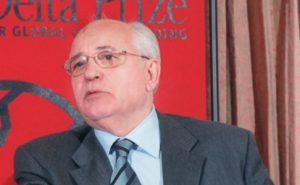Mikhail Gorbachev – 2001 Delta Prize Recipient
In 1987, Mikhail Gorbachev published a book titled Perestroika: New Thinki ng for Our Country and the World. In addressing the whole global community, the leader of the Soviet Union hoped to initiate an inclusive international discussion on the future of humanity. He said: “It’s my conviction that the human race has entered a stage where we are all dependent on each other. No country or nation should be regarded in total separation from another, let alone pitted against another.”
ng for Our Country and the World. In addressing the whole global community, the leader of the Soviet Union hoped to initiate an inclusive international discussion on the future of humanity. He said: “It’s my conviction that the human race has entered a stage where we are all dependent on each other. No country or nation should be regarded in total separation from another, let alone pitted against another.”
It is this commitment to communication transcending intercultural hostilities that the Delta Prize for Global Understanding was established to honor. The Delta Prize is not a peace prize per se, although we would expect interdependence and communication to help make peace possible among groups in conflict with each other. It is a prize designed to bring recognition to extraordinary efforts to advance understanding in a world where customs, ethnocentric allegiances, religious beliefs, and political alliances make dialogue sometimes seem impossible to achieve.
Globalization has indeed made the world’s nations interdependent and has brought cultures with very different histories and values into close proximity with one another. In so doing, globalization has brought intense pressure upon nations to cooperate with one another at the same time that it threatens to efface their longstanding identities. Our global society demands that the world’s diverse peoples learn to talk with each other with respect for each other’s differences, whether it be between nations or within nations.
What characterizes all our Delta Prize recipients–President and Mrs. Carter and the Carter Center; Archbishop Desmond Tutu; and now President Mikhail Gorbachev–is their leadership in promoting respectful discussion among people fearful of the changes wrought by globalization. Such discussion becomes the basis for understanding and hence cooperation.
In his book, Gorbachev wrote:
The development of a new mode of thinking requires dialogue not only with people who hold the same views but also with those who think differently and represent a philosophical and political system that is different from ours. For they also carry the historical experience, culture, and traditions of their peoples; they are all part of world development and are entitled to their own opinion and to an active role in world politics.
We are honoring President Gorbachev tonight for his promotion of freedom of expression and change in the former Soviet Union and for his advocacy–as in his book’s subtitle–of “new thinking for our country and our world.” As his country’s political leader he helped to bring the cold war to an end.
But we are honoring President Gorbachev as well for his accomplishments since his presidency, including his endeavors to make a healthier planetary environment for us all. When the Rio de Janeiro Earth Summit passed a resolution in 1992 to form Green Cross International, President Gorbachev became its founding President. Its mission is to work with businesses, governments, and individuals around the world to encourage practices and ideas that will make a sustainable future for the human race. Through Green Cross International, President Gorbachev has himself engaged in efforts to eliminate weapons of mass destruction, prevent international water conflicts, and promote the Earth Charter.
We hope that the Delta Prize for Global Understanding will come to symbolize the hope that is born of such efforts to bring about cooperation through understanding.
